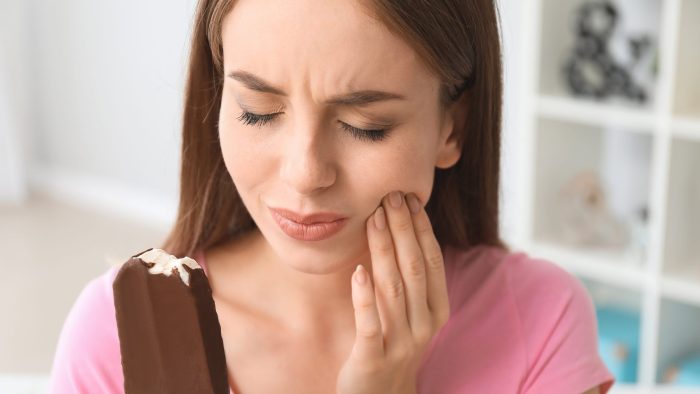
What Causes Sudden Tooth Sensitivity?

You take a sip of your iced tea and you feel a painful sensation in your teeth. It’s a similar feeling when you enjoy your hot morning coffee. The likely culprit? Sensitive teeth. Around 1 in 8 adults in the U.S. experience tooth sensitivity but fortunately, our Portage, MI, dentist can help you find relief.
Here are the symptoms, possible causes, treatment options, and prevention tips for sensitive teeth.
Common Symptoms
The biggest symptom if you have is radiating pain, much like a toothache. More specifically, the discomfort is at the roots of the affected teeth. The pain feels like it goes deeper but is often not prolonged enough to make you think there’s an emergency. Knowing when it occurs, i.e., after teeth are exposed to cold air, also reassures you that it’s more of a fleeting thing and not necessarily an all-hands-on-deck issue.
Sensitivity becomes more obvious when consuming hot, cold, sweet, or acidic foods and beverages. Brushing and flossing teeth or using alcohol-based mouthwash can also result in discomfort. Symptoms can range from mild to intense and mainly appear when triggered.
Pinning Down a Cause
Because having sensitive teeth is a commonly shared condition, several factors could be at play. Some individuals even experience tooth sensitivity naturally due to age. Our dentist will need to inspect your teeth and gums to determine what the exact cause is.
Until then, possible causes of sensitive teeth include:
- Exposed tooth root
- Worn tooth enamel
- Fractured teeth
- Fillings that are worn or damaged
- Gum disease
- Tooth decay or cavities
- Aggressive brushing
- Nighttime teeth grinding or clenching
- Regular consumption of acidic foods or beverages
Levels of Tooth Sensitivity
Sensitivity varies greatly from person to person. Some individuals may only experience mild discomfort when eating cold foods, while others might find it painful to even breathe in cold air. Mild sensitivity might not interfere much with daily activities, but moderate to severe sensitivity can significantly impact your quality of life, making it crucial to take extra precautions when considering a cosmetic treatment like teeth whitening, for example.
Is There Treatment for Tooth Sensitivity?
Fortunately, there are . The caveat, however, is that the treatment depends on the cause of the sensitivity. Our dentist will need to perform a dental exam to look closer inside your mouth.
The findings from the examination will then influence the ultimate decision on treatment. If you have mild tooth sensitivity, our dentist may recommend a desensitizing toothpaste or a softer toothbrush. A fluoride gel application on your teeth to strengthen enamel may also prove helpful.
Treatment for more severe cases of tooth sensitivity may include a:
- Gum graft for receding gums
- Root canal
- Custom-made night guard to discourage grinding
Underlying medical conditions contributing to sensitivity should also be treated separately to prevent further damage to enamel.
Tips to Prevent Tooth Sensitivity
Assuming you are not predisposed to sensitive teeth, there are ways to prevent the condition altogether. You may have to make a lifestyle adjustment, such as watching the foods that you eat. Other tips are easy, like regularly practicing oral hygiene habits.
Tooth enamel serves as the hard, protective layer for your teeth. When this covering wears down, the layer beneath your enamel, dentin, becomes exposed. Dentin is less dense and contains small, hollow tubules. Exposed tubules allow cold, hot, or acidic food and beverages to better reach the nerves and cells inside the tooth. This causes sensitivity.
You can prevent the onset of tooth sensitivity at home with these tips:
- Don’t brush too hard and use a soft toothbrush
- Avoid acidic foods or drinks, i.e., soda, candy
- Seek treatment for teeth clenching or grinding to protect enamel
- Ask our dentist about current or future teeth whitening treatment as it can result in sensitivity
- Brush your teeth at least twice a day and floss daily
- Stay away from abrasive toothpaste (especially those with charcoal)
Call Our Portage Office Today
Sensitive teeth could be a warning sign that something is wrong. Our dentist in Portage serving Greater Kalamazoo, MI, can examine your mouth and find the underlying cause. We can also provide guidance on next steps and ways to alleviate discomfort. Request an appointment by calling Courtside Dental today at (269) 327-1011.
This blog has been updated.

